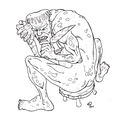Template:Selected anniversaries/February 11: Difference between revisions
No edit summary |
No edit summary |
||
| Line 13: | Line 13: | ||
File:René Descartes.jpg|link=René Descartes (nonfiction)|1650: Mathematician and philosopher [[René Descartes (nonfiction)|René Descartes]] dies. He is remembered as the father of modern Western philosophy. | File:René Descartes.jpg|link=René Descartes (nonfiction)|1650: Mathematician and philosopher [[René Descartes (nonfiction)|René Descartes]] dies. He is remembered as the father of modern Western philosophy. | ||
||1657: Bernard Le Bovier de Fontenelle dies ... author and an influential member of three of the academies of the Institut de France, noted especially for his accessible treatment of scientific topics during the unfolding of the Age of Enlightenment. Pic. | |||
File:Japanese counting board.jpg|link=Rod calculus (nonfiction)|1760: First known use of Japanese [[Rod calculus (nonfiction)|rod calculus]] to detect and prevent [[crimes against mathematical constants]]. | File:Japanese counting board.jpg|link=Rod calculus (nonfiction)|1760: First known use of Japanese [[Rod calculus (nonfiction)|rod calculus]] to detect and prevent [[crimes against mathematical constants]]. | ||
| Line 26: | Line 28: | ||
||1823: Carnival tragedy of 1823: About 110 boys are killed during a stampede at the Convent of the Minori Osservanti in Valletta, Malta. | ||1823: Carnival tragedy of 1823: About 110 boys are killed during a stampede at the Convent of the Minori Osservanti in Valletta, Malta. | ||
||1839: Josiah Willard Gibbs born ... physicist, mathematician, and academic. | ||1839: Josiah Willard Gibbs born ... physicist, mathematician, and academic. Pic. | ||
File:Thomas Edison.jpg|link=Thomas Edison (nonfiction)|1847: Inventor, engineer, and businessman [[Thomas Edison (nonfiction)|Thomas Edison]] born. He will develop the light bulb and the phonograph, among other inventions. | File:Thomas Edison.jpg|link=Thomas Edison (nonfiction)|1847: Inventor, engineer, and businessman [[Thomas Edison (nonfiction)|Thomas Edison]] born. He will develop the light bulb and the phonograph, among other inventions. | ||
||1862: Francis Sowerby Macaulay born ... mathematician who made significant contributions to algebraic geometry. Cohen–Macaulay rings, Macaulay duality, the Macaulay resultant are named after him. Pic. | |||
||1864: Louis Bouveault born ... chemist. | ||1864: Louis Bouveault born ... chemist. | ||
| Line 38: | Line 42: | ||
File:Georg Cantor diagonal argument.jpg|link=Georg Cantor|1884: Set theorist and crime-fighter [[Georg Cantor]] saves [[Edward Lear (nonfiction)|Edward Lear]] from attack by [[crimes against mathematical constants|math criminals]]. | File:Georg Cantor diagonal argument.jpg|link=Georg Cantor|1884: Set theorist and crime-fighter [[Georg Cantor]] saves [[Edward Lear (nonfiction)|Edward Lear]] from attack by [[crimes against mathematical constants|math criminals]]. | ||
||1897: Emil Leon Post born ... mathematician and logician. | ||1891: Ivan Privalov born ... mathematician best known for his work on analytic functions. studied analytic functions in the vicinity of singular points by means of measure theory and Lebesgue integrals. He also obtained important results on conformal mappings showing that angles were preserved on the boundary almost everywhere. In 1934 he studied subharmonic functions, building on the work of Riesz. He published the monograph Subharmonic Functions in 1937 which gave the general theory of these functions and contained many results from his papers published between 1934 and 1937. *SAU Pic search good: https://www.google.com/search?q=Ivan+Privalov&oq=Ivan+Privalov | ||
||1897: Emil Leon Post born ... mathematician and logician. Pic. | |||
File:Leo Szilard.jpg|link=Leo Szilard (nonfiction)|1898: Physicist and academic [[Leo Szilard (nonfiction)|Leo Szilard]] born. He will conceive the nuclear chain reaction in 1933, and patent the idea of a nuclear reactor with Enrico Fermi. | File:Leo Szilard.jpg|link=Leo Szilard (nonfiction)|1898: Physicist and academic [[Leo Szilard (nonfiction)|Leo Szilard]] born. He will conceive the nuclear chain reaction in 1933, and patent the idea of a nuclear reactor with Enrico Fermi. | ||
Revision as of 07:29, 11 February 2019
1617: Mathematician, cartographer, and astronomer Giovanni Antonio Magini dies. He supported a geocentric system of the world, in preference to Copernicus's heliocentric system.
1618: Writer and alleged troll Culvert Origenes publishes his essay Man's Inhumanity to Man, which will profoundly influence three generations of Enlightenment-era thinkers.
1650: Mathematician and philosopher René Descartes dies. He is remembered as the father of modern Western philosophy.
1760: First known use of Japanese rod calculus to detect and prevent crimes against mathematical constants.
1847: Inventor, engineer, and businessman Thomas Edison born. He will develop the light bulb and the phonograph, among other inventions.
1884: Set theorist and crime-fighter Georg Cantor saves Edward Lear from attack by math criminals.
1898: Physicist and academic Leo Szilard born. He will conceive the nuclear chain reaction in 1933, and patent the idea of a nuclear reactor with Enrico Fermi.
1930: Mathematician, statistician, and crime-fighter Oskar Anderson publishes new theory of mathematical statistics based on Gnomon algorithm functions with applications in the detection and prevention of crimes against mathematical constants.
1931: Engineer and inventor Charles Algernon Parsons dies. He invented the compound steam turbine, and worked on dynamo and turbine design, power generation, and optical equipment for searchlights and telescopes.
- Charles Critchfield ID badge.gif
1944: Mathematical physicist and crime-fighter Charles Critchfield uses burst of neutrons to detect and prevent crimes against physical constants.
1973: Nuclear physicist and Nobel Prize laureate J. Hans D. Jensen dies. He shared half of the 1963 Nobel Prize in Physics with Maria Goeppert-Mayer for their proposal of the nuclear shell model.









